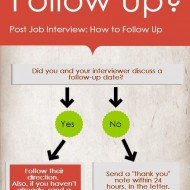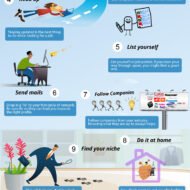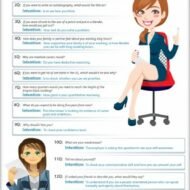Currently Browsing: Interview Questions
Posted by Managementguru in How To, Human Resource, Resume Samples, Social Media
on Mar 20th, 2020 | 0 comments

If you are not getting hired inspite of possessing all the required credentials, then it’s time you looked into your social media profiles. Posting inappropriate pictures or information, discriminatory comments related to gender, race and religion, derogatory comments about your previous employer or fellow employee are some of the top reasons for not getting hired. Picture Source – Pixabay Showing a business owner you are the right person to fill their job opening is not easy. Business owners receive hundreds of resumes for each of the job openings they post. When looking through a large pile of resumes, a hiring manager will be looking for things that catch their attention. If you are trying to modernize your resume, you should think about including information about your social media profiles. LinkedIn is one of the most popular social media platforms on the planet. Over 675 million entrepreneurs and business professionals use this website on a monthly basis. If you feel like your existing resume needs to be retooled, then be sure to visit ResumeBuild. This website provides you with the tools needed to make your resume more appealing and informative. Here are some of the things you need to consider when trying to include social media in your resume. Great Social Media Profiles Make You Look Well-Rounded Submitting a resume that is both full of information and easy to read is crucial to your long-term success in your chosen industry. A hiring manager is looking for candidates that exhibit all of the qualities their company holds dear. If you are trying to show a hiring manager how well-rounded you are, then including information about your social media profiles is a great idea. “5 Must Read Tips On How Any Service Business Can Achieve Insane Growth With Facebook Ads“A must read from Socialgrowr that emphasizes “Facebook advertising is a great way that can make your business experience exponential growth and increase traffic with just little effort.” While it is important to highlight the skills you have, you also need to show a potential employer that you have things going on outside of work. This is why giving them a glimpse at your social media profiles is crucial. Showing a potential employer you are successfully managing a work/life balance can make you a more appealing candidate. A Professional Image is Important Are you trying to show off your professionalism? If so, then including your social media profiles on your resume is a must. Platforms like LinkedIn are designed to allow professionals to network with each other. The profiles on LinkedIn can include information about your past jobs and a list of the skills you possess. Crafting content and posting on your LinkedIn page is also a good idea. Publishing industry-specific blogs is a great way to show a potential employer how knowledgeable you are. Before you start to share links to your social media pages, take some time to freshen them up. Doing things like updating your work history or adding new skills can come in handy when trying to attract the attention of a hiring manager. The more information you have about yourself on a social media profile, the easier it will be to land the job of your dreams. Tricks to find guest blogging opportunities and tools for keyword generatorA comprehensive resource about guest posting as a link building strategy and backlink checker tool from Spopli Show a Company You are a Good Fit For Their Culture Before you apply for a job with a particular company, take a look at their culture. If a company has a culture based on wellness and hard-work, you need to do all you can...

Posted by Managementguru in How To, Human Resource, Interview Questions
on Aug 13th, 2015 | 0 comments

Here is a brief and concise article on how to go about post job interview follow-up https://www.youtube.com/watch?v=oHHRI3Qcb8Q So tell me, should candidates send a follow up note after an interview? Yes, always. Whether or not a candidate is truly in the running, the interviewer can get crazy busy and it’s important to always follow up with a note and even a call in a week if there’s no word back on next steps. Candidates should never be afraid to ask for acknowledgement and closure, even if it’s not the news they want to hear. It is a great way to not only let someone know that you appreciated their time and insights – but also to make sure they are aware of your interest and enthusiasm, and reinforce how you “fit”. From a recruiting perspective, what’s the purpose of sending a follow-up? The follow-up is a way to reiterate interest and reaffirm why the candidate is the best fit for the role. It’s never too late, although at that point the hiring manager may have already made her decision. But front-running candidates do decline offers and take other positions, so there’s always a possibility of being considered. A note will probably not be able to turn around an interview that did not go well, but it could be something that could help differentiate you from equally strong candidates. From a recruiting perspective, the recruiter will appreciate someone showing their understanding of and connection with the company, the role, and/or the people they met. That could make a big difference. Picture Courtesy: Careerbliss Show that you can be graceful: Follow up with post-interview thank-you letters to each person you talked with on your job interview. The first step in your follow-up is a polite handwritten note card to each interviewer. You won’t be able to fit many words on each note card, and you don’t need to. Your handwritten thank you note is very important, because the biggest problem you face after your job interviews is that the interviewers forget who you are. They will literally forget you unless you bring yourself back to mind by mentioning something specific that you and each interviewer talked about. An interviewee says: You guys have no idea how effective this method is! In my last interview, I left knowing that I bombed it because I wasn’t receiving any positive feedback from my interviewer. I was pretty bummed out by it but nevertheless, I sent him a thank you letter via email just to thank him for his time. I didn’t expect a response but little did I know, a few days later I got a nice reply from him and a week after that, I got called in for a second interview! Just goes to show how far a little effort can take...

Posted by Managementguru in How To, Human Resource, Interview Questions
on Oct 19th, 2014 | 0 comments

How to Negotiate a Job Offer Setting Yourself up for a Successful Career Opportunity: Find out all the particulars about the company you are applying for. Thank the employer for the offer, even if it’s not workable for you. Negotiate a time frame for deciding upon whether to take it or leave it. Do your homework thoroughly online. Think about whether the potential job matches your needs and goals. Research the competition. Find out what kind of leverage you have, if any. Picture Courtesy : ManagementParadise Negotiating Your Best Offer Possible: Get in contact with your liaison or hiring manager one more time. Before going into the negotiation, know your minimum and target salary. Ask for more money without actually spelling out a number. Brush off the employer’s attempts to pin you down to a number Wait for the employer to offer a number. Present a better offer if you feel like you’re worth more. Incorporate benefits or perks into the conversation. Get everything in writing. Picture Courtesy : Salary.com Consideration of Other Details: Listen to your instinct during the entire negotiation process. When asking for a salary, ask for a correct number. Don’t play the pity card. Be affable, understanding, and never burn bridges. Be confident. “Let us never negotiate out of fear, but let us never fear to negotiation”~ JFK “During a negotiation, it would be wise not to take anything personally. If you leave personalities out of it, you will be able to see opportunities more objectively.” – Brian Koslow ...

Posted by Managementguru in How To, Human Resource, Interview Questions, Organisational behaviour, Stress Management
on Jun 21st, 2014 | 0 comments

A job interview can be viewed as a mutual “exchange of information” because it provides the candidate with an opportunity to both gain information about the department and position, and to discuss his/her own skills, and career goals in relation to the job. Interviewing helps managers determine three things before they make a hiring decision. 1. Can you do the job? 2. Are you motivated to do the job? 3. Are you a good fit in the organization? Acing yourself is an important part of the interview process. The time you spend gearing up before the interview will be time well spent in your job search process. The following are some tip-offs on what you can do to prepare yourself before, during, and after a job interview. Before the Interview Assess the Job Specification and Position Description Review your résumé and be prepared to discuss your appropriate skills. Decide who your references are. A current or past manager, coworker, teacher/professor or associate may come in handy to vouch for your skills/accomplishments. Be ready with extra copies of your résumé Dress for Success -Appearance should display maturity and self-confidence. Be neat, clean, and dress in good taste. Find out where the interview will be, obtain clear directions, and confirm the time. Plan to arrive 10- 15 minutes early. During the Interview Relax! Think of the interview as a conversation, not a cross-examination Be whole-hearted, self-assured, polite, and open. Listen to the questions carefully and give clear, crisp, and precise answers. Convey interest in the organization and knowledge of the position. Ask relevant questions about the job or department. Present a list of your references and any letters of recommendation or reference that you may have to offer. End the interview with a firm handshake and thank the interview panel for their time and consideration. After the Interview Send a crisp thank-you letter within 24 to 48 hours of the interview. Reiterate your interest in the position; mention the key skills you know that strengthen your place in the organization, and your contact information. If you are not chosen for the job, it is OK to graciously accept your defeat and ask the interviewer which area(s) you could improve on in the future!...

Posted by Managementguru in Human Resource, Interview Questions, Strategy, Training & Development
on Jun 5th, 2014 | 0 comments

How do you answer “What is Your Greatest Weakness?” Job Interview Question or JIQ #2 “Our greatest weakness is that, We are unwilling to accept our weaknesses.” If you are subjected to this question in a job interview – “What is your greatest weakness?” what will be your response or reaction? You would have been bowled over by the time your brain scans for some reply (way-out) that would be appropriate. This kind of a question can potentially damage or salvage your job prospects – Yes! It solely depends on how honest you are in dealing with your own weaknesses or short comings and also how wisely you are able to turn it to your advantage. Your response tells the interviewer a lot about your uprightness, so it unquestionably holds a lot of weight.” “To err is human But to forgive is not in an interviewer’s agenda.” Never choose a weakness that indicates your inappropriateness for the job: “A salesman has to be good at communication” “An accountant needs to be good at calculations” “A teacher has to have a patient attitude to manage the students” Will you hire a person with quick temper for a customer relationship position? Will you hire somebody who lacks charisma to be a team-leader? Here, we are just not talking about the technical skills alone, but also about attitude and emotional traits of a person that define his/her personality. Remember that a weakness isn’t necessarily bad: So, the main idea of throwing this question in an interview is not to pull your legs down (though sometimes the interviewee falls a prey by his own naivety), but to gauge how well you can handle or had handled a pressure-situation in previous jobs. Try not to expose your personal weakness- If you say you can’t get up early in the morning, do you think your hiring manager will appreciate the idea? Try to rationalize how you transformed a weakness into strength by perception and perseverance in a purely job-related context. Don’t blurt stereo-type answers: Be direct in your approach and avoid stereo-type answers which will irritate the interviewers; I’m a perfectionist, I pay attention to detail, I never relax, I’m a workaholic- all these responses will sure-fire you from the prospective list. These are neither strengths nor weaknesses but only hypocritical projections of your “self.” These kind of compliments should come from people around you and sometimes it is funny how the greatest strength becomes the greatest weakness too. Do Your Homework Properly: Think about this, if you are a workaholic who spends 15 hours a day adding prosperity to the company, your boss might be happy, but will your wife and children be happy? I’m able to feel the heat from the women folk – the same applies to you too. Though the subject deviates to work-life balance, the undercurrent of the discussion is not to mention your weakness that is directly related to the job you are applying for. Do your homework properly by analyzing the job specification and description thoroughly and decide if you will fit the bill. Mention the areas you are trying to improve upon; you can very well say, “I’m trying to improve my prioritization skills which would help me to line up tasks and complete projects well within the time limit.” You can highlight how you were an introvert and how you have transformed yourself as a “people-person” by realizing that it is the order of the day to be successful in a professional environment. Avoid Rehearsed answers: “If you don’t know your weakness, take a personality type quiz and the results...










